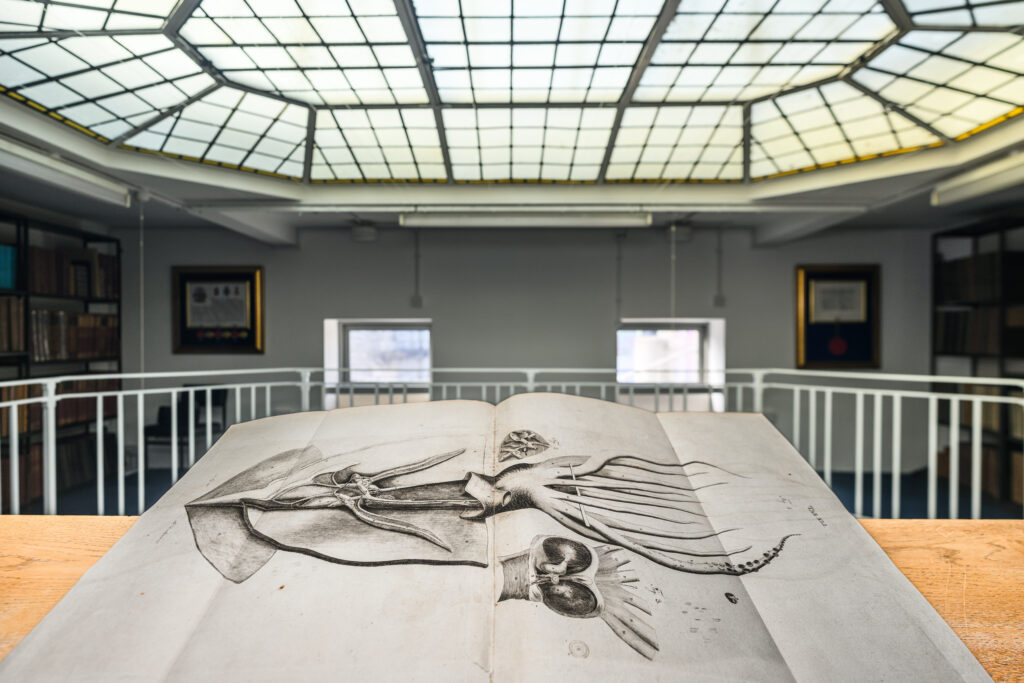
As the Marine Biological Association (MBA) celebrates its 140th anniversary, we continue to be a leading voice in marine science and conservation, driving positive change for our ocean and the future of our planet.
Our National Marine Biological Library (NMBL) is one of the largest marine reference libraries in the world. Its vast collection of latest publications, rare books, scientific artifacts, and archival materials makes it an invaluable resource for anyone interested in the study of marine biology.
The library contains over 16,000 books and 4,000 print journals in its vast collection. Our unique collection of rare books includes first editions and copies dating back to 1554, with beautiful illustrations gracing their pages.
The archive contains thousands of individual items, such as the scientific work and personal correspondences of a number of well-known marine researchers.
This includes personal papers of naturalist and explorer Edward A. Wilson (1872-1912), who was part of the first National Antarctic Expedition with Robert Falcon Scott.
The archive is also home to the MBA Herbarium – a collection of hundreds of samples of marine algae as well as lichens, some dating as far back as the 1850s.

Library origins
Since the formation of the Marine Biological Association; it was clear that excellent library facilities were needed to support the scientific research. A public appeal was made in 1887 for gifts and periodicals, and a small library committee was formed to deal with the generous responses.
A successful application was made to the Government for the Challenger Reports . Report on the Scientific Results of the Exploring Voyage of H.M.S. Challenger, 1873-76, and exchange agreements were entered into with foreign governments.
By the time of the official opening in 1888, a respectable collection of books and periodicals were in place in the library, situated in a large room on the top floor of the west end of the building, where most books were kept until 1931.

Journal of the Marine Biological Association
In 1887 the Journal of the Marine Biological Association (JMBA) soon become one of the leading scientific journals published in Britain. For the Association it formed an important article of exchange by which other publications were obtained for the library, and it remains so to this day.

A growing collection
In 1902 the contents of the library were already overflowing onto additional shelves and in 1914 it was noted that further space would be needed as the room would be unsafe due growing collection. In 1930 a funding appeal was launched to convert an existing laboratory space [MP1] into a new library.
The funding appeal was well received and allowed immediate start to the construction of a new library wing in 1931. This included the replacement of the sloping roof by a flat one, a third storey as a gallery and additional bookstacks. The new space for books and reading was much appreciated by staff and an increasing number of visitors.
Wartime threat
From 1940 to 1941, A series of bombing raids carried out by Nazi German Luftwaffe caused destruction and devastation in the city of Plymouth. On March 20 1941, the MBA was struck by a stick of incendiary bombs accompanied by a small high-explosive bomb. Despite damage to the Director’s residence and north building rooms, miraculously the library survived these nights of terror with only the glass in the windows and lantern roof-light shattered.
The decision was made to move the collections to the comparative safety of Hawkmoor House, Tavistock during the war. Over the course of ten days in May, two lorries would be loaded with books, with staff and visiting workers forming a human chain to pass these books to and from transport. For the next three and a half years, only a few reference works and recent volumes of periodicals were kept in the north building cellars.

New developments
With the help of the Natural Environment Research Council, a new library extension started in 1973. The building operations were complicated by the need first to complete a new workshop at the east end of the site then to demolish the old workshop to free space for building. The new extension was completed in 1975 doubling the space for shelving so it was possible to bring back books previously kept in storage.

Digital future
Due to its wider importance to the marine biological community, the library was designated the National Marine Biological Library (NMBL) in 1996.
The library has undergone significant modernisations throughout the 21st century, adapting to the evolving needs of its Members. In a major milestone, the library embraced the digital age in 2013 by launching an online catalogue accessible to anyone with internet access.
A grant from The Wolfson Foundation enabled the NMBL to revolutionise its services and adapt to the digital age.
Thanks to a generous grant, the library was able to establish the Wolfson Training Suite which provides a versatile and professional space for various corporate needs.
In 2016, The Southward Reading Room was officially opened by Eve Southward and in the presence of the Lord Mayor of Plymouth and the Windsor Herald, who unveiled the MBA’s new coat of arms. The reading room is named after Professor Alan Southward who made a generous donation to the library.
In 2023, online records of the MBA Archive was launched. A wealth of archive materials, from historic research papers to correspondence between former scientists can be accessed using this online resource.
All of this work wouldn’t be possible without the dedication from librarians and volunteers over the years. The Library has benefitted from a core team of dedicated volunteers, carrying out a variety of work to conserve and promote the extensive print collection. Our volunteers enthusiastically help with any work or projects that the Library requires – most recently this has included cataloguing material that is part of the MBA archive, as well as an ongoing project to conserve the rare books in our collection.